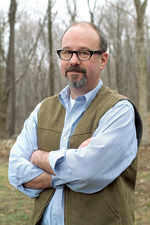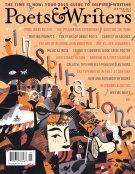Dwight Garner is one of the most beloved book critics writing today. His New York Times reviews, whether positive, negative, or mixed, are always entertaining—not an adjective most would use to describe book criticism. Language comes alive in his reviews; one gets the sense that he’s playing with words and having fun along the way.
 Raised in West Virginia and Naples, Florida, Garner started writing for alternative weeklies such as the Village Voice and the Boston Phoenix after graduating from Middlebury College. In 1995 he became the founding books editor of Salon, where he worked for three years, followed by a decade as senior editor at the New York Times Book Review. He has been a daily book critic for the New York Times since 2008. The author of an art book, Read Me: A Century of Classic American Book Advertisements (Ecco, 2009), he is currently working on a biography of James Agee. You can follow him on Twitter, @DwightGarner.
Raised in West Virginia and Naples, Florida, Garner started writing for alternative weeklies such as the Village Voice and the Boston Phoenix after graduating from Middlebury College. In 1995 he became the founding books editor of Salon, where he worked for three years, followed by a decade as senior editor at the New York Times Book Review. He has been a daily book critic for the New York Times since 2008. The author of an art book, Read Me: A Century of Classic American Book Advertisements (Ecco, 2009), he is currently working on a biography of James Agee. You can follow him on Twitter, @DwightGarner.
With Goodreads, Amazon, and countless blogs, it seems like everyone’s a book critic these days. What credentials do critics have that make them critics? And what was your own path to becoming a professional book critic?
No credentials are required to write criticism: Either your voice has authority or it doesn’t. Either it has style and wit or it doesn’t. Thank God there’s no grad program, no Columbia School of Criticism. Nearly all the best critics are to some degree autodidacts. Their universities are coffee shops and tables covered with books.
I grew up in a house that didn’t have many books in it, beyond the Bible and Reader’s Digest Condensed Books, at any rate, and where culture wasn’t particularly valued. I loved reading critics—book critics, movie critics, rock critics—from the time I was young. They gave me someone to talk to, in my mind, about the things I cared about. I’m the kind of reader who’s always flipped first to the “back of the book” of magazines, or to the arts pages of any newspaper. I worked in a record store during high school and wrote rock reviews for the school newspaper. This makes me sound almost cool; I was not almost cool. I was also the editor of my college paper. But I prefered writing book reviews, which I also did. Writing book criticism seemed to me then, and seems to me now, a chance to talk about everything that matters—the whole world, really.
You can’t trust Amazon reviews; I’m less certain about Goodreads, which I don’t know enough about. I’ve found it to be a terrific resource for certain kinds of information. Good writing is good writing wherever it appears, definitely including blogs. The more voices the merrier.
Facebook and Twitter have been a terrific boost to authors and publishers. Has social media aided your role as a critic?
I forget who it was who said that Facebook is a smart service for simple people while Twitter is a simple service for smart people. Ouch, right? But true enough. Twitter is companionable if you follow the right people, and you can dip into real-time conversations about books. You can see what people are saying; you can glean links to reviews. If people I respect are talking about a book, and it’s not on my radar, I’ll put it on my radar. I’ve reviewed books because I’ve seen interesting people talking about them.
Does buzz—a big advance or an author’s name—influence you?
Buzz matters and it doesn’t matter. Occasionally you might weigh in on a book because you have something to add about something everyone is talking about, perhaps to deflate the hype. Book critics envy movie critics only in that movie critics write weekly about things people are talking about and are likely to see.
Are you able to select which books you review or are they assigned to you? If you have a relationship with a publicist or editor, does it tip the balance?
At the Times we pick our own books. The daily books editor, Rachel Saltz, is a mensch, though, and is great at suggesting things. I review six or seven books a month; my schedule is two reviews one week, one the next. It’s about [equivalent to] the schedule of a major-league pitcher. Two or three of those books I know almost on contact that I want to review, because I’m interested in the author or I’m interested in the topic. After that, it gets headache-making. I sit down once a week or so with a big pile of galleys and poke around in them, looking for signs of life.
Relationships with publicists and editors (I don’t have many of those) don’t matter, either—a book is worthwhile or it isn’t, and the good ones know that. Having said that, a really good editor or publicist will know that very rare occasion to send up the bat signal, to indicate that a genuinely extraordinary book is on the horizon. Alas, even the bat signal, three times out of five, turns out to be hype.
Given the inordinate amount of review copies you must receive daily—just how many do you receive on an average day?—it seems like an e-reader would possibly help lighten the load. But the allure of physical books—even with galleys—is so hard to resist, isn’t it?
I get twenty-five to thirty books a day, and they really pile up on the porch. Last summer an elderly woman heard our three dogs barking—the windows were open, and we were out—and she saw the huge, sloppy pile of mail out front. She knocked on our neighbor’s door and asked, “Do you think the person who lives there is dead?”
I read e-books sometimes, mostly on my phone, but I don’t like to review from them. I write all over my books, I really mark the shit out of them, and I’m not confident that the notes I take on, say, a Kindle, will be recoverable in ten years. They’ll vanish, like the e-mail messages or the photos you meant to save from the laptop you owned three laptops back. So give me the dead-tree edition. I suspect I’ll always feel this way. Oddly, I do prefer to read magazines now on my phone or laptop. I find it easier on the eyes.
Have you ever changed your mind about a book that you praised or panned years earlier?
I deeply regret one or two reviews I’ve written. I was too hard, once, on a writer with a first book out; I still mope about my arrogance. These are the kind of reviews I’ve heard described as, “You know that thing you’ve never heard of? It sucks.” I regret a few raves, too—times when I’ve gotten carried away. I want readers to trust what I have to say on an intergalactic level but also on a bank-card level. Books aren’t cheap. I don’t want thousands of people walking around thinking they’d like to dun me for $26.95.
When you’re reviewing a new book from an author with previous books to his or her name, do you read the author’s backlist as well?
Very nearly always. It matters especially with fiction. I recently read the first three volumes of Karl Ove Knausgaard’s My Struggle in just a few days. Each is five hundred pages or so. It felt like I was back in college, cramming for an exam. But those are beautiful books, and I feel lucky to have been able to submerge myself in them. It was like having a lovely fever.
Negative reviews: Do they have a purpose and a place? When a review is mostly a summary with nary a positive or negative opinion in sight, is that essentially a kind version of a negative review?
I hate summary reviews, unless the critic is very knowlegable about the topic and is sort of touring it for you. It’s among my goals as a critic to rarely if ever write one. You can’t trust a critic who doesn’t write negative reviews. Most books simply aren’t that good. I try to find things to admire even in books I don’t like, and I try not to be punitive and to have a sense of humor. But what’s a critic for if not to think clearly, make fine discriminations, and speak plainly?
There’s been a lot of talk within book-critic circles about the VIDA Count and calls for more racial and cultural diversity. Do you take this into consideration when deciding what books to review?
I try not to think about it. I try to pluck the books I most want to review, and hope that my interests are not so unlike everyone else’s that the mix will be a genuine mix. But it’s always in the back of the mind. It matters.
If you could change one thing about the book-reviewing process or the world of book criticism, what would it be?
I wish more young novelists wrote criticism, or at least kept a hand in. Some do, but fewer than in generations past. Doing so used to be part of being in the guild. I discovered a lot of novelists through their criticism. Now everyone plays nice, at least in print, and it gets dull.
What books that you aren’t reviewing are you most looking forward to reading in the near future?
The notion of reading for pleasure versus reading for work doesn’t have much meaning for me—it’s always both. But when I’m off duty, I most often find myself poking around in cookbooks. I thought my wife and I owned a lot of them; we have eight hundred or so. Then I met Nathan Myhrvold, who has fifteen thousand! I guess if you’re that wealthy it’s easier to be a collector.
I also like to read poetry and things like old collections of rock writing. Robert Christgau’s record guides from the seventies, eighties, and nineties are devilishly funny, and I find all kinds of things I want to listen to in them. I’ve heard that Christgau is writing a memoir. There’s a book I’m looking forward to. Put me down for that.
Michael Taeckens has worked in the publishing business since 1995, most recently at Graywolf Press and Algonquin Books. His website is michaeltaeckenspr.com.








